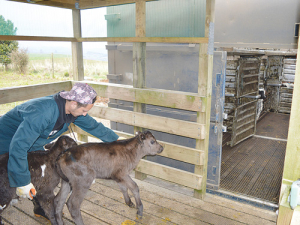The Ministry for Primary Industries (MPI) says farmers nationwide appear to be better treating bobby calves headed for slaughter.
This is a response to last year’s new regulations requiring proper facilities for loading calves onto trucks, including shelter, and the rule that sick calves or those up to four days old must not be sent to the works.
MPI manager of animal compliance, Peter Hyde, told Dairy News compliance this year is very good, as it was last year.
He says in 2017 only six calves out of every 10,000 arriving at meat plants were defective; he reckons so far this season the number is the same or slightly better.
“Compare that with 2008 when 68 per 10,000 calves arrived in a poor state. Over the years we have seen significant improvement and we got a very big improvement in 2017 and now this year,” he says.
Hyde refers to MPI’s ‘follow the bobby calf truck programme’: MPI vets and inspectors follow trucks onto dairy farms for inspection including checking the loading facility. They check the calf shelter and the calves presented for trucking.
“This year we have checked trucks in Northland, Waikato, Manawatu and Southland and, yes, we’ve been pleased with the rate of compliance. So far we’ve found only one farm with no loading facility and that farmer has been ordered to stop sending calves to the meat works until he gets a loading facility.
“Two farms had inadequate shelter so again they’ve been ordered to get shelter in place and we will re-inspect.”
The rules allow fines for truckers who take sick calves to the works, and now MPI is hearing of truckers leaving calves on farms because they judge they are unfit for trucking.
Hyde says farmers should take greater responsibility for their animals and not leave it to truck drivers to decide what animals should go to the works.
MPI is also closely monitoring calves arriving at saleyards and has so far issued three infringement notices to people presenting unfit calves at sales.
“The message is aimed at people who might understand that because we have 200 vets in meat plants they think they might be able to offload weak or poorer calves at saleyards.
“But we are inspecting saleyards also and we’ll take action if we find non-compliance.”
MPI staff have this season issued 40 infringement notices which carry an instant fine of $500. Offences have included calves being blind in both eyes, unable to walk and poor general health.
Hyde says the number of such infringements is roughly the same as this time last year, but it’s much better than several years ago.











